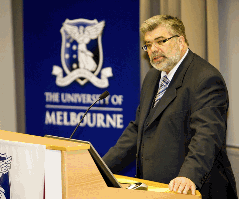|
|
|
|
|
|
|
News & Views item - September 2010 |
![]() Senator Carr Gives Universities Australia's Plenary Meeting a
Rousing Pep Talk. (September 21, 2010)
Senator Carr Gives Universities Australia's Plenary Meeting a
Rousing Pep Talk. (September 21, 2010)
 Universities
Australia yesterday held its Plenary Meeting at the University of Melbourne and
was addressed by the federal Minister for Innovation, Industry, Science and --
oh yes, I remember now-- Research, Senator Kim Carr.
Universities
Australia yesterday held its Plenary Meeting at the University of Melbourne and
was addressed by the federal Minister for Innovation, Industry, Science and --
oh yes, I remember now-- Research, Senator Kim Carr.
He opened somewhat peevishly: With the unusual contingencies of the new Parliament, and in a media environment in which rigorous policy plays second fiddle to pseudo-analysis of relationships, a discussion of values might seem out of place.
This was followed with: Labor starts from the premise that you can’t have an internationally competitive economy and high standards of living without a strong innovation system. And that you can’t have a strong innovation system without great universities and researchers. Australia’s capacity to do original, quality research is critical to our future wellbeing.
And a tabulation of the marked improvement from 2007-10 in resourcing the university sector, and the claim that: Ours is a long term agenda, and we need to continue to take opportunities for further action. Which must have sounded rather hollow in the light of Melbourne University's Professor Simon Marginson's recent observation: "There's something missing in Canberra. There's an inability to fold universities into the national project in a constructive way. Judging by the fact that neither side of politics took a meaningful policy on universities and research to the election, it is a bipartisan weakness."
If the time ever comes that Senator Carr is prepared and examine where Australia stands in its support for tertiary educational institutions in comparison to the best in the world, and what the long term program will be for Australia to become included, then he might have genuine pretention to being an advocate. However, on current indications we would appear to stand a better chance of rejoining the world group in Davis Cup competition.
The good senator concluded sounding perhaps a bit like Henry V haranguing the troops before the battle of Agincourt:
But we need to face up to the facts about our budgetary constraints over the next period.
These realities of budgetary practicality constrain us in some ways but must not stop us in our tracks.
We must continue, together, our program of cultural change, our pursuit of international competitiveness, and our agenda for structural reform.
We need to promote the diversity of the sector and encourage each institution to identify and develop its unique contribution.
We need to continue to develop a strategic approach to science and research, including planning for Australia’s future research infrastructure needs.
We need to work smarter across the sector to target research in areas of growing need, such as climate change.
We need to re-energise international research collaboration.
We need to embed the humanities and social sciences in the mainstream of science policy, both in their own right and as essential partners in innovation. Human factors are as important as technology and knowledge of the physical world to new approaches to problems and opportunities.
We need to strengthen public engagement with science and research, to build support, understanding and consensus of scientific evidence and the role it plays in shaping our future.
We need to work with New Zealand and the Western Australian Government to secure the Square Kilometre Array for Australia, and work with the Victorian Government to ensure the future of the Australian Synchrotron.
We need to deliver a national research workforce strategy that sets up Australia for a high-value, high-quality future. This means providing attractive and sustainable career opportunities for the next generation of researchers.
Initiatives to support women, indigenous researchers, early career researchers and those returning to research are all essential for boosting our research performance, and maximising the participation of Australia’s research talent.
Of course, all of these initiatives will be shaped to support our drive for quality, which has to be the foundation of everything we do.
We are keen to work together with constructive input from the sector on the challenges that confront us and the programs we implement to address them – from ERA to TEQSA, from multidisciplinary research to career progression – so we can help individuals pursue their goals, institutions find their niches, and the country improve its standards of living.
Finally: Our key goal is to build the partnerships between universities and business, between research and economic activity... I am interested in preserving the enduring values that make us a technologically advanced, civilised, industrial society. Universities have a vital role to play by engaging in the public debate necessary to enhance these goals.
And while flogging compacts, hubs and spokes, the ERA, and the TEQSA, a total absence of any reference to the role of universities in regard to what Macquarie University's vice-chancellor, Steven Schwartz, refers to as the "widespread dismay with an existing trend in higher education, the focus on skills to the detriment of education".
Well perhaps Senator Carr sees that as an undergraduate matter, not part of his brief, and therefore an issue with which he needn't be concerned.